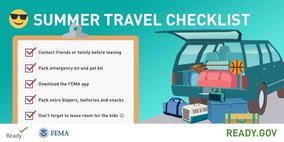
The Fourth of July is approaching, and that means barbeques and fireworks! Many people love seeing the bright colors fly through the night air, but it is important to keep in mind that fireworks are explosives, and only professionals should handle them.
A study by the U.S. Consumer Product Safety Commission (CPSC) shows that more than 200 people, on average, go to the emergency room every day with fireworks-related injuries in July close to the Independence Day holiday. Follow these tips to prevent injury from fireworks:
For more information on fireworks safety, check out the CPSC Fireworks page.
|
SPC Apr 24, 2024 1630 UTC Day 1 Convective Outlook
-
SPC 1630Z Day 1 Outlook
[image: Day 1 Outlook Image]
Day 1 Convective Outlook
NWS Storm Prediction Center Norman OK
1120 AM CDT Wed Apr 24 2024
Valid 2...
3 hours ago

